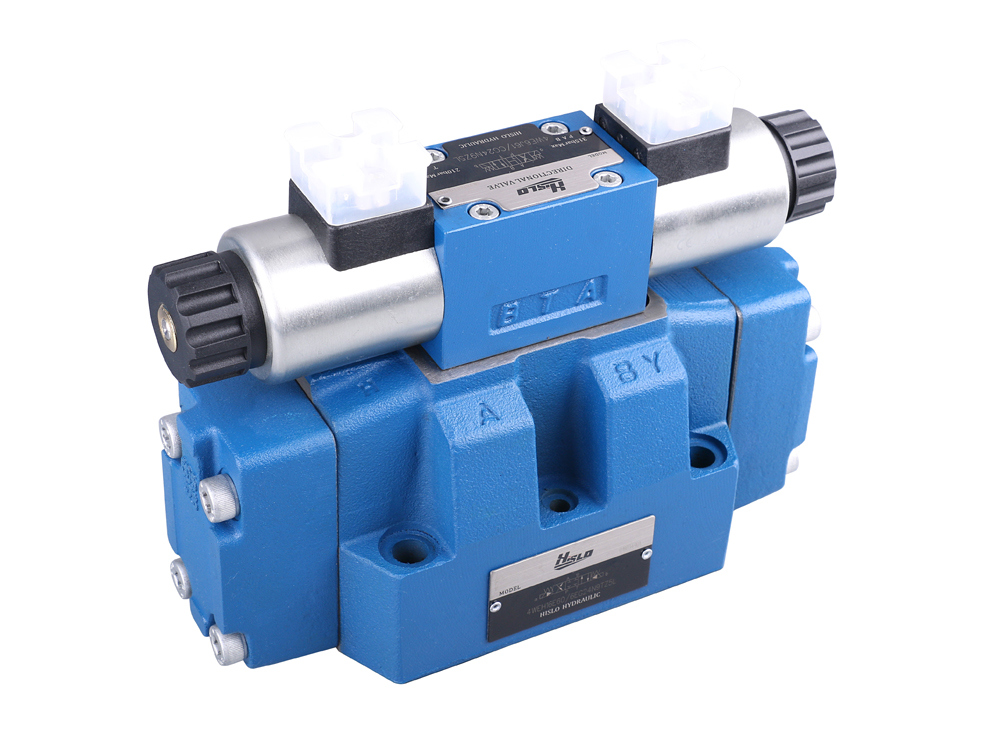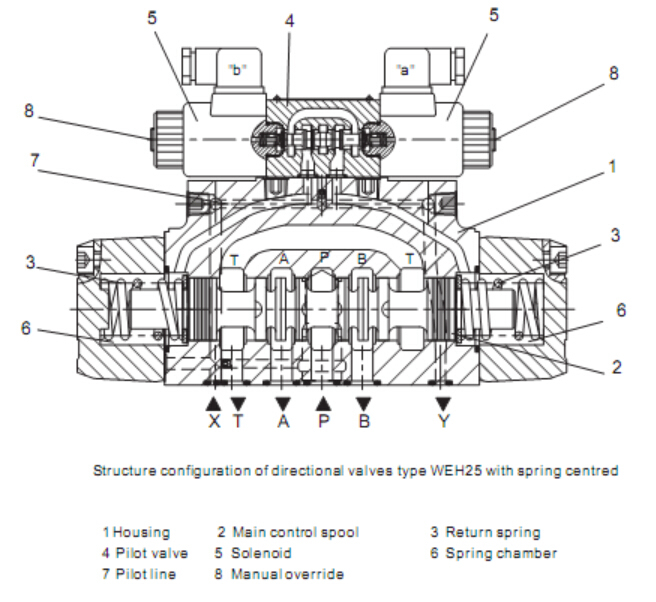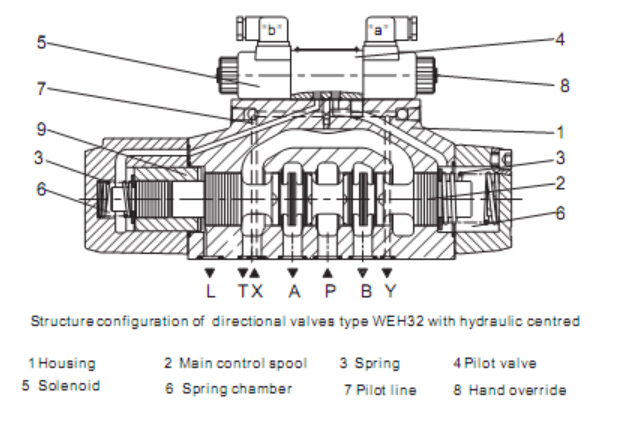TaiFong , https://www.tfmadeflowers.com





4weh16 Electro-Hydraulic Directional Control Valve
Model NO.: 4WEH16E6X6EG24N9ETZ5L
Pressure: High Pressure
Valve Structure: Pilot Piston Structure
Power Supply: DC Solenoid Valve
Usage: Emptying
Standard: DIN
Application: Industrial Usage, Water Industrial Usage, Household Usage
Nodular Cast Iron: Qt500
Trademark: Power or OEM
Transport Package: Carton
Specification: ISO9001
Origin: China
HS Code: 84812010
Model NO.: 4WEH16E6X6EG24N9ETZ5L
Pressure: High Pressure
Valve Structure: Pilot Piston Structure
Power Supply: DC Solenoid Valve
Usage: Emptying
Standard: DIN
Application: Industrial Usage, Water Industrial Usage, Household Usage
Nodular Cast Iron: Qt500
Trademark: Power or OEM
Transport Package: Carton
Specification: ISO9001
Origin: China
HS Code: 84812010
Electro-hydraulic directional valves type WEH use solenoids as pilot control. It is for sub-plateÂ
mounting, and its porting  patten accords with DIN 24 340 and ISO 4401.
There are many different features and additional device for selection.
Solenoids of pilot valve are wet-pin DC or AC.Â
The main valve uses spring or hydraulic centered and spring or hydraulic offset. With or withoutÂ
shifting time adjustment; With or without stroke adjustment ; Â Pre-load valve or throttle insert canÂ
be installed in the main valve. Pressure reducing valve can be installed when operating pressureÂ
exceeds 25 MPa.
Valves of type WEH are directional spool valves with electrohydraulic operation, using the directionalÂ
valve as pilot control. They control the start, stop and direction of a fluid flow.
The directional valves basically consist of the main valve with housing (1), main control spool (2), oneÂ
or two return springs, and the pilot valve (4) with one or two solenoids.
The main control spool (2) is held in the neutral or in the initial position either by the springs or byÂ
means of pressure. Pilot valve has wet DC or AC solenoids (5), optional. The main control spool isÂ
shifted by pilot valve (4).
The pilot valve has 4 versions (see symbols).
Hereinafter it is illustration for various valves.
4/3-way directional valve with spring centred of the main valve.
The main control spool (2) is held in the neutral position by two return springs (3), and the two springÂ
chambers (6) are connected to the tank via the pilot valve (4). The pilot oil is supplied via the pilot lineÂ
(7). When the pilot valve (4) switches direction(one solenoid of the pilot valve energizes), the pilotÂ
fluid acts on the one end of the main spool (2) and pushes it (2) to move and the required port isÂ
connected, thus the flow direction of the fluid is changed.
When the solenoid is de-energized, the pilot spool returns to its initial position (exception: impulseÂ
valve). The spring chambers (6) are connected to tank by pilot valve (4). Under the force of spring, theÂ
spool returns to its neutral position. The oil in the spring chamber (6) flows to return line from externalÂ
port Y or internal line T via the pilot valve (4).
4/3-way directional valve with hydraulic centred of the main control spool.
The main control spool (2)  is held in the neutral position by  pressure oil acting on the two end faces,Â
and is located in the neutral position by a locating sleeve(9).
By removing the pressure from one of the spool(2) ends, the main control spool(2) is moved to theÂ
shifted position. The fluid in unload chamber flows into Y channel via the pilot valve(4) , and the internalÂ
drain fluid direct return to tank via port L.
Electro-hydraulic directional valves type WEH use solenoids as pilot control. It is for sub-plateÂ
mounting, and its porting  patten accords with DIN 24 340 and ISO 4401.
There are many different features and additional device for selection.
Solenoids of pilot valve are wet-pin DC or AC.Â
The main valve uses spring or hydraulic centered and spring or hydraulic offset. With or withoutÂ
shifting time adjustment; With or without stroke adjustment ; Â Pre-load valve or throttle insert canÂ
be installed in the main valve. Pressure reducing valve can be installed when operating pressureÂ
exceeds 25 MPa.
Valves of type WEH are directional spool valves with electrohydraulic operation, using the directionalÂ
valve as pilot control. They control the start, stop and direction of a fluid flow.
The directional valves basically consist of the main valve with housing (1), main control spool (2), oneÂ
or two return springs, and the pilot valve (4) with one or two solenoids.
The main control spool (2) is held in the neutral or in the initial position either by the springs or byÂ
means of pressure. Pilot valve has wet DC or AC solenoids (5), optional. The main control spool isÂ
shifted by pilot valve (4).
The pilot valve has 4 versions (see symbols).
Hereinafter it is illustration for various valves.
4/3-way directional valve with spring centred of the main valve.
The main control spool (2) is held in the neutral position by two return springs (3), and the two springÂ
chambers (6) are connected to the tank via the pilot valve (4). The pilot oil is supplied via the pilot lineÂ
(7). When the pilot valve (4) switches direction(one solenoid of the pilot valve energizes), the pilotÂ
fluid acts on the one end of the main spool (2) and pushes it (2) to move and the required port isÂ
connected, thus the flow direction of the fluid is changed.
When the solenoid is de-energized, the pilot spool returns to its initial position (exception: impulseÂ
valve). The spring chambers (6) are connected to tank by pilot valve (4). Under the force of spring, theÂ
spool returns to its neutral position. The oil in the spring chamber (6) flows to return line from externalÂ
port Y or internal line T via the pilot valve (4).
4/3-way directional valve with hydraulic centred of the main control spool.
The main control spool (2)  is held in the neutral position by  pressure oil acting on the two end faces,Â
and is located in the neutral position by a locating sleeve(9).
By removing the pressure from one of the spool(2) ends, the main control spool(2) is moved to theÂ
shifted position. The fluid in unload chamber flows into Y channel via the pilot valve(4) , and the internalÂ
drain fluid direct return to tank via port L.